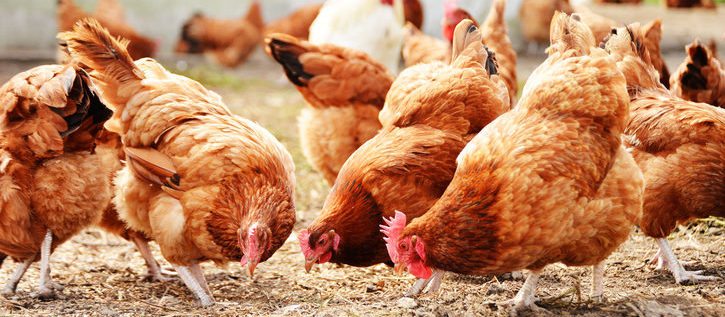
As far as livestock go, poultry are pretty efficient. They convert feed into food products quickly, and leave relatively little trace on the environment. On the other hand, this efficiency comes at a price—poultry have high nutrient needs.
Poultry diets vary depending on the type of bird, but they all share common threads:
- Cereal grains
- Proteins and amino acids
- Animal by-product meals
- Fats
- Vitamins and minerals (usually in the form of pre-mixes)
Working together, these ingredients help with poultry growth, reproduction, and health. Of course, this doesn’t even account for one of the most crucial elements to poultry nutrition—water.
Water Isn’t Everything.. But It’s Really Important
Believe it or not, birds consume twice as much water as feed, making it a critical part of any poultry health discussion. Water supplies are dynamic and ever-changing, and can be impacted by:
- Environmental temperature
- Relative humidity
- Salt and protein levels of the diet
- A birds’ productivity (rate of growth or egg production)
- A birds’ individual ability to resorb water in the kidney
A steady supply of cool, clean water free of potentially toxic substances will ensure that your poultry is in a position to thrive. The best way to monitor your water supply is to test it regularly. Consider testing it for general pH, as well as minerals like sodium, chloride, iron and manganese, calcium and magnesium-hardness, nitrates and nitrites, and sulfur-sulfates.
It’s worth noting that a lack of water altogether is as dangerous (or more) as unclean water. In a mere 12 hours, water deprivation could impede the growth of young poultry and egg production for layers. 36 hours or more is catastrophic—you’ll see a jump in the mortality rates of both young and mature birds.
Feed Ingredients to Consider
Once you have your water supply taken care of, it’s time to shift focus towards your feed ingredients. As mentioned above, some common ingredients, such as cereal grains and fats, are required for all poultry. Below is an outline of important considerations for several of these components.
Carbohydrates
Carbohydrates provide a substantial level of energy for poultry, and are usually found in poultry feed in the form of corn, wheat, and other cereal grains. Some of these ingredients are more easily digested than others, so supplements are often required. These enzyme preparation supplements improve nutrient absorption for your birds.
Proteins & Amino Acids
Proteins, and more importantly the amino acids found in dietary protein, help make up the skin, feathers, bones and ligaments of poultry. They also help form the organs and muscles that are so important for optimal poultry functioning.
It’s important to note—getting the balance of proteins and amino acids right is trickier than it may seem. The levels needed depend heavily on the type of bird, the size of the bird, and the function (for example, a mature rooster requires fewer amino acids than a laying hen). Do some serious research on the specific needs of your breed will go a long way, here.
Fats
For poultry feed, fats serve to boost overall energy concentration. In turn, this increases the productivity and feed efficiency of your birds. Common sources of fats are:
- Grease from restaurants
- Rendering from animal carcasses
- Refuse from vegetable oil refining
Antioxidants play a critical role in preserving unsaturated fatty acids, and should always be included as a supplement to the fats in your poultry feed. For this reason, corn is a great fat source—it’s fatty acids are mostly unsaturated.
Minerals
Minerals are required for numerous essential poultry functions. As The Poultry Site notes, calcium and phosphorous are vital in the formation of the skeleton, and sodium, potassium, magnesium and chloride function to stabilize a bird’s pH levels.
Different minerals are more or less essential depending on the type of bird and it’s function—a hen, for example, needs ample calcium for eggshell production. The consequence of deficiency is severe—the hen will rapidly stop laying as calcium is taken from its skeletal reserves.
Vitamins
Classified into two different categories (fat soluble and water soluble), vitamins ensure everything from sufficiently yellow yolks to minimal stress in the bird. To the relief of many farmers, most dietary poultry supplements already contain a surplus of vitamins—a deficiency is unlikely as long as your flock is receiving adequate levels of supplements.

